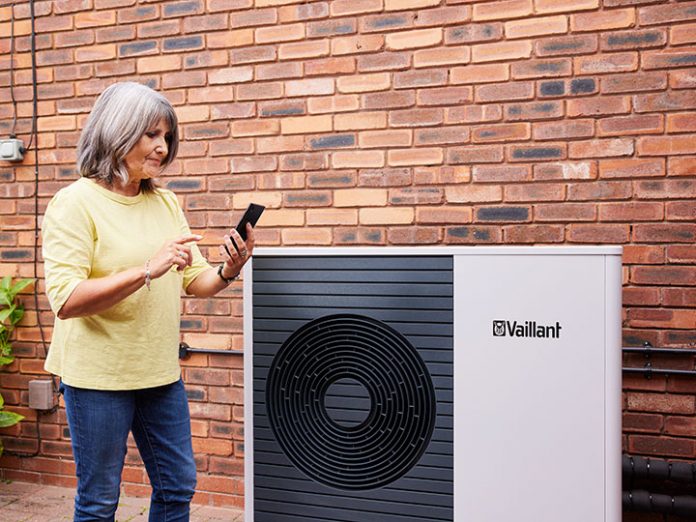Britain’s £450 million drive to strip out domestic boilers in favour of lower carbon heat pumps is under-publicised, under-staffed and under-performing, a committee of the House of Lords claims today.
Uptake of the Boiler Upgrade Scheme is lagging at less than half the intended rate since its launch in May, the Lords’ Environment & Climate Change Committee says. It calls on ministers for urgent improvement, including carrying almost £80 million of unspent cash from its first year of budget into the second.
Low public awareness and a lack of trained technicians dog the scheme, the committee found.
The scheme offers £5,000 grants to qualifying homes seeking to upgrade heating from conventional gas boilers to electric heat pumps, in practice overwhelmingly air-sourced. The Johnson administration expected the scheme to notch up 20,000 home instals for each of its three years.
Instead, figures for the BUS’s first nine months show that upgrades are running at an annual rate of only 10,000 or so. The committee is asking that the unspent share of the full £150 million allocated for the subsidy’s first year be kept available into the second, and not clawed back by chancellor Jeremy Hunt.
At less than 7,700 completed instals before this month, completed replacements are running significantly behind the government’s release of funds to billpayers, reinforcing widely held fears among trade bodies about a shortage of qualified technicians.
With 17% of the UK’s greenhouse gas emissions coming from homes, the committee’s chair Baroness Parminter reminds ministers in a letter today that the transition to low-carbon heat is fundamental to Net Zero.
“The government must quickly address the barriers we have identified to a successful take-up of the Boiler Upgrade Scheme in order to help grow the take up of low-carbon heating systems. It is vital they do so if we are going to meet our Net Zero ambitions,” she writes.
Among those barriers, says the committee, are the government’s inadequate promotion of the scheme, the shortage of installers, and insufficient independent advice for householders.
Even with the grants, heat pumps remain too expensive for even middle-income homes, the peers allege. As chancellor, Rishi Sunak scrapped VAT on heat pumps & low carbon home power in last March’s budget.
Last month British Gas offered purchase and installations of air source pumps starting at £3,000. Last week Octopus undercut its rival, offering £2,500 for an entry level system. Most homes would pay only £4,000 for a pump with a 20-year life, said the supplier, double a conventional boiler’s.
Misleading messages including from the Government over hydrogen’s long term suitability to heat homes, adds to bill payers’ confusion, says the committee.
Fears over running costs could also deter pump take-up, say peers. Progress is urgently needed through electricity market reform to ensure they are affordable.
Methods for awarding Energy Performance Certificates need revision, their Lordships recommend, to properly reward households seeking to switch to low-carbon heating. Planning laws should be relaxed, so pumps can be sited closer to neighbouring homes.
Their pleas echo early awareness among tradespeople of the BUS’ failings. As early as July installers’ groups were calling for a rethink. The following month, the Heat Pump Association called for radically expanded training to boost numbers of technician from 3,200 in 2021, to over 50,000 this decade.
More scathing criticism of the BUS, and of the peers’ desired improvements, came today from the century-old Energy & Utilities Alliance, representing trade bodies in water & industrial heating and equipment manufacture.
EUA CEO Mike Foster, “While we agree the Boiler Upgrade Scheme is failing, we want to see it scrapped, rather than see the recommendation of the committee to double-down on the flawed policy be supported.”
“Giving a £5,000 taxpayer handout to the well-off is immoral and simply cannot be justified when millions are living in fuel poverty and we all face a 20 per cent increase in our bills from April”, said the EUA head.
The Heat Pump Federation was more supportive, echoing the Lords’ strictures.
“The committee’s findings chime precisely with what heat pump installers and consumers are telling us”, said Bean Beanland, the HPF’s director of growth & external affairs.
“We are delighted that the House of Lords Environment and Climate Change Committee finds that significant changes must be swiftly made to give the heat pump industry the opportunity to deliver on the original policy intent”.
“Heat pump take-up across the country is increasing, as is industry investment, but the BUS’s first year of operation has been challenging for all the reasons outlined by the Lords Committee,” the HPF spokesperson went on.
Improvements to the BUS, plus early Whitehall action on the fair pricing of increasingly low carbon electricity, would prime investment & training needed for the growth anticipated due to the Future Homes Standard expected in 2025 and the consulted-on ban in 2026 of replacement oil boilers in homes off the gas grid.





A ground source heat pump (GSHP) will provide 4 kW of heat for 1 kW of electricity to power it, but air source heat pumps (ASHP) are less efficient depending on the outside air temperature so they will have an electric heater to back them up during cold periods which only gives 1kW of heat for 1kW of electricity, so GSHPs should always be fitted when ever possible. The well for an average house can usually be drilled in a day and often less depending on the strata to be drilled. For my house which is over sandstone, the cost for a 120m deep hole including the flow and return pipes is £4,500.
The Energy Savings Trust website is clearly wrong by suggesting that a GSHP for an average house costs £24,000 for a serpentine of pipes “buried in trenches” or £49,000 “if you dig a borehole” see
https://energysavingtrust.org.uk/advice/ground-source-heat-pumps/ These exaggerated costs will put off anyone in investing in a heat pump, and you don’t “dig a borehole”, you use a portable rotary drilling rig; see: https://dragondrilling.co.uk/ The present Government support of the cost of a GSHP is an insult at £6,000 which is why few people are taking it up.